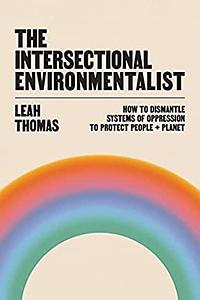Take a photo of a barcode or cover
553 reviews for:
The Intersectional Environmentalist: How to Dismantle Systems of Oppression to Protect People + Planet
Leah Thomas
553 reviews for:
The Intersectional Environmentalist: How to Dismantle Systems of Oppression to Protect People + Planet
Leah Thomas
Powerful. Challenging. Eye-opening. The Intersectional Environmentalist is required reading.
This book covers a lot of ground -- representation, environmental justice, anti-racism, feminism, privilege, ableism, veganism, green energy, and a whole lot more. It's dense. Super dense. But that's the point -- there's no more room for delicacy right now. Thomas gets straight to the heart of the issues, fully intent on making a lasting difference. To call this work important is an understatement.
For some looking for an all-in-one kind of resource, The Intersectional Environmentalist won't feel like enough. With so many intertwined issues being presented at once, it can feel overwhelming. But for people looking for a launchpad to develop their most impactful work, this is it.
Everything is well-cited and sprinkled with lots of quality quotations to give perspective. A list of further reading, listening, watching, and supporting acts as a great supplement for people who feel inspired after reading. This Tool Kit portion takes up about a third of the book and is not to be missed.
The author describes The Intersectional Environmentalist as "simultaneously a call to action, a guide to instigating change for all, and a pledge to work towards the empowerment of all people and the betterment of the planet." Nobody could've said it better.
Thanks to NetGalley, the author, and the publisher for providing a copy of this book in exchange for my honest review.
This book covers a lot of ground -- representation, environmental justice, anti-racism, feminism, privilege, ableism, veganism, green energy, and a whole lot more. It's dense. Super dense. But that's the point -- there's no more room for delicacy right now. Thomas gets straight to the heart of the issues, fully intent on making a lasting difference. To call this work important is an understatement.
For some looking for an all-in-one kind of resource, The Intersectional Environmentalist won't feel like enough. With so many intertwined issues being presented at once, it can feel overwhelming. But for people looking for a launchpad to develop their most impactful work, this is it.
Everything is well-cited and sprinkled with lots of quality quotations to give perspective. A list of further reading, listening, watching, and supporting acts as a great supplement for people who feel inspired after reading. This Tool Kit portion takes up about a third of the book and is not to be missed.
The author describes The Intersectional Environmentalist as "simultaneously a call to action, a guide to instigating change for all, and a pledge to work towards the empowerment of all people and the betterment of the planet." Nobody could've said it better.
Thanks to NetGalley, the author, and the publisher for providing a copy of this book in exchange for my honest review.
informative
fast-paced
Such an important conversation to have and super informative! I loved the way it broke down complex and multifaceted constructs into easy to understand language with suggestions for how to spark change. Would recommend!
Very approachable, researched, and thorough! You’re obviously not going to get into every topic and nuance around climate Justice but this did a great job of at least touching on so many connections. There are discussion questions at the end of each chapter great for personal development or group conversations. It’s realistic and yet incredibly hopeful for something covering the interconnectedness of inequity and violence against people and planet. Very much takes the approach of “these are social constructs, so while we made them it also means we can change them” that I appreciate.
It’s a fun design (the pages vaguely looks like a Canva presentation) and accessible whether you’re new to these ideas or looking for new angles.
Good, but it is very much a “starter” book on the subject and I wouldn’t recommend it to people already familiar with the concepts it covers.
Additionally, I understand the author’s points about veganism and vegetarianism being more environmentally friendly, but I wish they also acknowledged the problems with the agriculture industry (pesticides, agricultural runoff causing environmental problems, labor rights, etc.) and the fact that veganism can be VERY inaccessible for poor folks or those living in food apartheid. These are issues that affect people in my own community. And while she states that many cultures already eat vegetarian diets, there are many that do not (and some that eat almost entirely animal products!). Do we expect them to change their cultural foods? We all need to eat. Food is not good or bad, it is neutral - it’s the agriculture industry that has problems that need to be addressed.
Additionally, I understand the author’s points about veganism and vegetarianism being more environmentally friendly, but I wish they also acknowledged the problems with the agriculture industry (pesticides, agricultural runoff causing environmental problems, labor rights, etc.) and the fact that veganism can be VERY inaccessible for poor folks or those living in food apartheid. These are issues that affect people in my own community. And while she states that many cultures already eat vegetarian diets, there are many that do not (and some that eat almost entirely animal products!). Do we expect them to change their cultural foods? We all need to eat. Food is not good or bad, it is neutral - it’s the agriculture industry that has problems that need to be addressed.
Definitely recommend! A good primer to these issues, but did include some info I didn’t know despite following most of the contributors’ accounts for a while.
a really informative and well written book. I feel like I learned so much and got a better understanding of intersectional environmentalism. I love the “tool kit” at the back that provides extra resources, podcasts, books, etc to expand your learning further.
This is a great primer and resource for those who want to dive into environmentalism or intersectional action. This is for you whether you are interested or already active in the community. A great primer for someone who is new and wants to learn, this book would be a perfect addition to any syllabus or bookshelf.
Thomas has a comprehensive and compelling work in The Intersectional Environmentalist. This should be required reading for every human; the connections Thomas makes are truly eye-opening, even if you have considered connections between racism, privilege, and environmentalism before. If you haven't considered how these things are connected, this work will blow your mind. The statistics are well-placed and emphasize the points Thomas is making. In our ever-changing world (for the worse, in terms of environmental health), works like Thomas's must be read, considered, and taken to heart for solutions on how to improve things for both our planet and our fellow humans.
challenging
emotional
informative
inspiring
reflective
fast-paced






